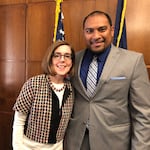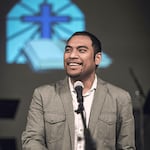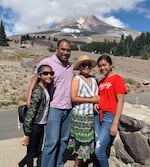This story was reported and produced in collaboration with NPR’s Next Generation Radio project.
On Sundays, Joe Enlet gives a sermon to his congregation in Vancouver, Washington in his native language, Chuukese. Usually, his church is filled with families, many of whom are migrants from Chuuk, Micronesia. The COVID-19 pandemic has left the church empty.
Now Enlet livestreams his sermons from his home across the border in Portland, Oregon, and encourages his congregation to host services in their homes and with their families virtually.
“Spiritually, we’re still staying connected and I feel that that’s a really powerful tool for our communities to continue to minister to one another and encourage one another during these difficult times,” Enlet said.
Pacific Islanders have the highest rates of COVID-19 in Oregon. Coronavirus infection rates are about 12 times that of white Oregonians, according to data from the Oregon Health Authority. This is partly because many Pacific Islanders are essential workers, working in factories and meat processing facilities where social distancing is not an option. There is also a need for culturally specific resources that include Micronesians who may not speak English; and many Pacific Islanders live in multigenerational households that may not allow for isolation if one family member becomes ill. Data collection on COVID-19 often lumps together all Pacific Islanders with Asians, making it difficult to pinpoint what type of assistance certain communities may need.

Data from the Oregon Health Authority's weekly report indicates that COVID-19 infection rates for Pacfiic Islanders are about 12 times higher that of white Oregonians as of July 29, 2020.
Kanani Cortez / Oregon Health Authority
Pacific Islander migrants from the Federated States of Micronesia, the Republic of Marshall Islands and the Republic of Palau have long felt barriers to medical access. Known as Compact of Free Association (COFA) migrants, they are allowed to live and work in the United States legally, but cannot access social safety nets the same way American citizens can. COFA migrants have difficulty accessing programs like unemployment benefits and the Oregon Health Plan. Lack of access to health care has resulted in high rates of chronic diseases, like diabetes and hypertension which put them at higher risk of COVID-19.

Enlet and Oregon Gov. Kate Brown at the Oregon legislature in Salem, Ore. in 2019. Enlet is the Consul General of Micronesia for the Western United States.
Courtesy of Joe Enlet
Enlet sees first hand how difficulty accessing health care and the impacts of COVID-19 play out in his community through the many hats he wears. He’s not only a pastor but the Consul General of Micronesia based in Portland, Oregon. Both roles allow him to advocate for Micronesian migrants, so others don’t have to struggle the way he did when he first arrived in the U.S.
Enlet’s introduction to life in the U.S. was in Los Angeles. He moved from the island of Weno in 2002, where he could walk around the entire island in a few hours. He struggled with the fast pace of American society. “I asked so many questions. Why are people talking fast, walking fast, driving fast? Everything is so fast,” Enlet said.
He struggled in other ways: Enlet was stopped by police officers in LA at gunpoint for, as he described it “driving too slow,” and he racked up medical debt that he’s still paying off. Eventually, he moved to Oregon to continue his theological studies. Enlet later saw a need for a church that serves the Chuukese population and in 2013 co-founded the Chuuk Logos Community Church.

Joe Enlet is a pastor at the Chuuk Logos Community Church where he serves a growing Chuukese population in Vancouver, Washington.
Courtesy of Joe Enlet
The church serves as a central gathering place for many Micronesians where togetherness is cherished. However, the pandemic has stripped many Pacific Islanders of the opportunity to practice their traditions. Usually, when someone dies, the church serves as a support system, oftentimes bringing community members together for days and sometimes weeks. Without the opportunity to gather during this pandemic Enlet worries for his congregation. “Our community has been in constant mourning because of COVID-19. There are still people who are in the hospital and we know them because our communities are so tightly knit together…So anything that hurts one family hurts all of us.”
The high rate of COVID-19 among Pacific Islanders in Oregon has brought the visibility Enlet has been fighting for, for years. “It’s unfortunate that it has to take a pandemic for people to recognize that there are existing issues in our communities,” Enlet said. “Because of our invisibility in society and our relatively small population, people don’t always listen to Pacific Islanders.” Enlets said now, they are finally being heard.

Joe Enlet lives in Portland, Ore. with his family. He enjoys playing guitar and spending time with his wife and two daughters.
Courtesy of Joe Enlet
Despite the pandemic, Enlet’s hope for his community remains strong. He said that he is confident in the resilience of his people, guided by the wisdom of his ancestors.
“Like a Micronesian navigator who would be on his sailing canoe across the blue Pacific Ocean with nothing in sight, just that canoe, but can say with 100% confidence that we will get to the destination very soon.”